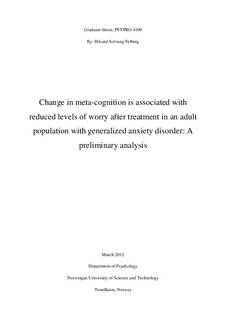Change in meta-cognition is associated with reduced levels of worry after treatment in an adult population with generalized anxiety disorder: A preliminary analysis
Master thesis
Permanent lenke
http://hdl.handle.net/11250/270818Utgivelsesdato
2012Metadata
Vis full innførselSamlinger
- Institutt for psykologi [3086]
Sammendrag
The Meta-cognitive model of generalized anxiety disorder (Wells, 1995) predicts that the most important factor in development and maintenance of GAD is negative meta-cognitive beliefs about the dangers and uncontrollability of worry. The present study aimed to examine the association between degree of change in negative meta-cognition and post-treatment levels of worry following treatment of generalized anxiety with Meta-cognitive therapy and Cognitive Behavioral Therapy. The main finding of the study was that change in negative meta-cognitions accounted for more than half the variance in post-treatment worry. These preliminary results provide further empirical evidence for the role of meta-cognitive change in GAD.
